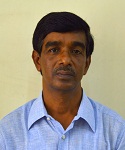
Prof. SHIB KINKAR DAS
West Bengal University of Animal and Fishery Sciences, India
Title: Issues and sustainability of wastewater re-use in aquaculture
Abstract:
Wastewater from domestic and urban sources is unlikely to contain pesticides, heavy metals and chemical contaminants but is inherent with invaluable resources as it contains the metabolized nutrients of the recently consumed food. The principal objective of wastewater reuse in aquaculture and allied activities is to recycle the inherent nutrients viz. nitrogen, phosphorus, carbon etc. through sequential biological processing ultimately to aqua and/or agri-crops. Above all such reuse and recycle approach mitigates environmental pollution, enhances aesthetic value and might be a powerful tool for socio- economic upliftment for the people of tropical and sub-tropical areas. However, a significant percentage of wastewater and excreta use in agri-aquaculture occurs at the subsistence level. Most wastewater-fed agri-aquaculture practices takes place in Asia with great diversity of systems. The differences lies in different systems are based on type of waste, degree of pre-treatment, system design of the culture units, species and cultivar of culture and integration with other production systems either horizontally or vertically. These systems either use wastewater, fresh human excreta or nightsoil and/or septage in untreated or partially treated forms. Contrary to this, wastewater-fed aquaculture declined in Europe because of increased land values, operational costs due to increase in wages of fish the farmers, and the need for an alternative treatment process in winter. In many countries, wastewater and excreta used in crop production are not adequately treated. WHO/UNICEF (2000) estimated the median percentage of wastewater treated by effective treatment plants to be 35% in Asia, 14% in Latin America and the Caribbean, 90% in North America and 66% in Europe. Therefore, the obvious issues of safety including the aesthetics of using wastewater in agriculture and allied activities has been surfaced and becoming more and more pertinent with increasing health consciousness and food safety standards. Accordingly, several guidelines were framed at different times by different authorities. The issue of safety including the aesthetics of using wastewater in agriculture and allied activities has been debated for long and such debates generated two contrasting school of opinions from the developed and developing worlds. Joint efforts by WHO, FAO and UNEP focussed resource recovery from wastewater that ultimately resulted in a common regulatory framework to support worldwide reuse of wastewater, grey water and excreta in agriculture and aquaculture. Socio-economic conditions very often limit the adherence to any such guidelines by every letter and spirit in the developing and underdeveloped worlds. However, with the increasing demand for biological produce through best management practices and adoption of quality control measures related with human health, the analyses of wastewater in aquaculture in the environmental and social parlour will continue to be assessed and reassessed.
Biography:
Prof. S. K. Das, M.Sc., Ph. D. in Zoology has been in research work on aquaculture and fisheries since 1987 and currently serving the Faculty of Fishery Sciences, West Bengal University of Animal and Fishery Sciences, Kolkata, West Bengal, India as Professor and Head, Department of Aquaculture. Prof. Das has been awarded Visiting Fellowship from the Science and Engineering Research Council, Department of Science and Technology, Govt. of India besides Fellowships from Council of Scientific and Industrial Research, Govt. of India for pursuing his research carrier. He has been awarded Ph. D. degree from the University of Kalyani, Kalyani, West Bengal, India during the year 1993. Prof. Das has been associated with several major Research Projects as Principal Investigator/Co-Principal Investigator funded by the Indian Council of Agricultural Research, Govt. of India and Department of Science and Technology, Govt. of West Bengal etc. He has published his research findings in National and International Journals of repute from the esteemed publishing house like Elsevier, Francis and Taylor, Springer, Verlag Paul Parey, Oxford & IBH etc. Prof. Das is associated with a good number of journals either as member of the Editorial Board or as Reviewer. Prof. Das has participated in a training programme on Aquaculture Development Organised by the MASHAV Centre for International Cooperation, Israel and Central Institute of Freshwater Aquaculture, Indian Council of Agricultural Research, India under mutual cooperation between Govt. of India and Govt. of Israel among so many other training programmes. Recently he has visited Colombo, Sri Lanka to participate and present his research findings on Application of Bioflocs Technology in aquaculture in an International Conference AgriFish 2017. Currently Prof. Das is working on in-situ remediation of aquaculture wastewater through microbial manipulation based on zero water exchange techniques. He is a Life Member of the Indian Science Congress Association and the Inland Fisheries Society of India.